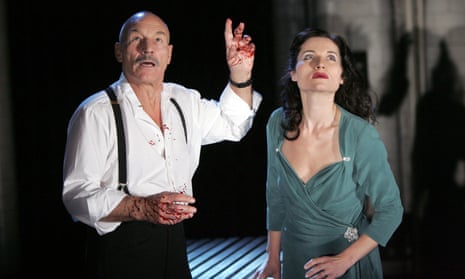In the Guide’s weekly Solved! column, we look into a crucial pop-culture question you’ve been burning to know the answer to – and settle it, once and for all
Thespians are a seriously superstitious bunch. Most know not to say good luck to an actor but there is So Much More: never leave the stage completely dark; never whistle in the theatre; never use a peacock feather on stage; never knit in the wings; and don’t even think about walking out of the dressing room right foot first. Perhaps the most notorious superstition surrounds the word “Macbeth”, which should not – except during a live performance – be uttered inside the theatre. In fact, the superstition is so deeply embedded that there is no sign for the word “Macbeth” in British Sign Language. To get round this “deadly” issue, actors refer to Macbeth as “The Scottish Play” or “The Bard’s Play”.
But is there any basis to this long-standing superstition? When Macbeth premiered circa 1606, King James I was on the English throne – and James was not a fan of witches. The execution of James’s mother, Mary, Queen of Scots, was said to have inspired a long-lasting obsession with the dark arts, one compounded after the king was caught in a brutal storm at sea when he was king of Scotland. Convinced that witches were to blame, James ordered a witch-hunt on his return home and swiftly wrote a book, Daemonologie, where he outlined his plans to root out witchcraft for good.
So when William Shakespeare staged a new play that saw three “weird sisters” recite some decidedly convincing spells, the public got scared. Rumours circulated that a coven of witches had put a curse on the play. Historians would later insist that the actor scheduled to play Lady Macbeth died suddenly before opening night. This turned out to be a myth conjured up by the 19th and 20th-century cartoonist and critic Max Beerbohm – but the dramatic die had already been cast.
Even the toughest cynics must concede there have been a number of Macbeth-related mishaps over the years. In 1672, an actor playing Macbeth in Amsterdam committed a real murder on stage. In 1721 and 1722, riots broke out during runs of the play in London. And in 1849, a rivalry between the English actor-manager William Macready and American actor Edwin Forrest turned deadly when fans of Forrest stormed Macready’s production. Still not convinced? In 1937, Laurence Olivier’s production of Macbeth was thwarted by disaster: theatre manager Lilian Baylis died during dress rehearsals; the director and the actor playing Lady Macbeth were caught up in a car accident; and a falling weight narrowly missed crash-landing on Olivier.
Of course, there are some far more practical reasons behind the superstition. Legend goes that if an actor hears the word “Macbeth” uttered in the theatre it’s because, being a big money-spinner, it is being touted as a replacement for their own failing play. Shakespeare’s tragedy is also packed with accident-prone action, including six murders, portentous storms and an entire forest upping sticks and traipsing across the stage. It’s no wonder a little blood (fake or otherwise) has been spilt throughout its 400-year performance history.
But best not risk it, eh? Thankfully, an antidote is on hand. If you do utter that fateful word, all you need to do is exit the theatre, spin round three times, spit, curse and ask to be let back in. Simple!
